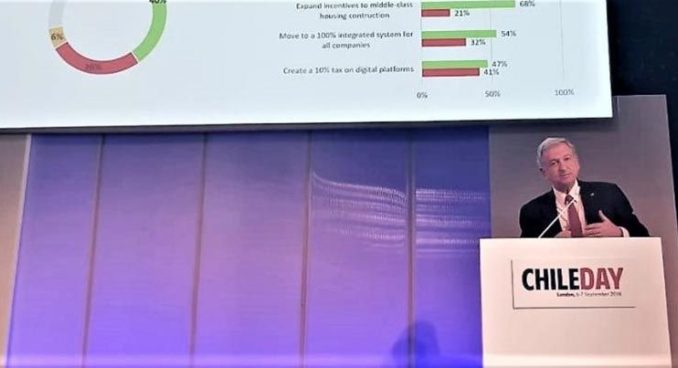
SANTIAGO – Within the framework of Chile Day in London, Minister of Finance Felipe Larraín has announced the sending to Congress of a bill to convert Chile into a “Regional Financial Center”.
The initiative, which was initially supported by a private public working table composed of the main regulators of the financial market and the Capital Market Consultative Council, will address ten work axes.
These will materialize in an initiative that addresses areas such as facilitating the registration of foreign securities in Chile, thus contributing to position Chile as a platform from which foreign issuer securities can be traded, in addition to other initiatives. In parallel, the Financial Analysis Unit (UAF), the Financial Market Commission (CMF), the Superintendence of Pensions and the SII will make modifications to their regulations with the same objective.
“Our goal is to put our country at the level of the most important International Financial Centers since this has positive impacts on economic activity and employment, therefore, on the well-being of all Chileans,” Larraín, who explained that the initiative will consider changes to approximately 11 existing legal bodies, to which the creation of autonomous texts will be added.
He added that if in the next 15 years the participation of the financial sector as a percentage of GDP increased by half of what grew in Singapore, employment in the sector would triple.
The axes of the bill will be:
1. Simplify procedures and reduce documentation requirements for non-resident investors, thus facilitating the entry of non-residents to the local market.
2. Adopt international practices in fixed income markets, thus allowing international investors to have access to the liquidity provided by local actors in the fixed income market. For this, the Over the Counter (over-the-counter market) transaction platforms will be regulated, in order to allow AFPs to transfer fixed-income instruments under that modality.
3. Facilitate the registration of foreign securities in Chile, thus contributing to position Chile as a platform from which foreign issuer securities can be traded.
4. Eliminate tax asymmetries between locals and foreigners that affect financing in the local market. “Having good macroeconomic conditions and good institutions is necessary, but it is not enough. We want to be a world-class financial center and for this we have looked at the experience of countries like Hong Kong and Singapore among others. ”
5. Eliminate tax asymmetries for operations carried out in the capital market that are similar. This will contribute to increasing the efficiency of the markets.
6. Simplify the process of issuing securities: This will prevent market conditions from changing significantly in the period between the decision to be financed through the issuance of a security in the financial market and, the current issue.
7. Improvements in the legislation applicable to financial market infrastructures, thus favoring the services of securities settlement, payments and market information being provided in accordance with the highest international standards.
9. Improve the legal framework of certain financial contracts, so that the counterparties can mitigate the risks of these contracts properly.
10. Flex the investment limits of institutional investors. One of the measures in this axis will be to modify DL 3,500 to enable some of the limits of pension funds, such as those referring to alternative assets, to be defined in the Investment Regime.–MercoPress
